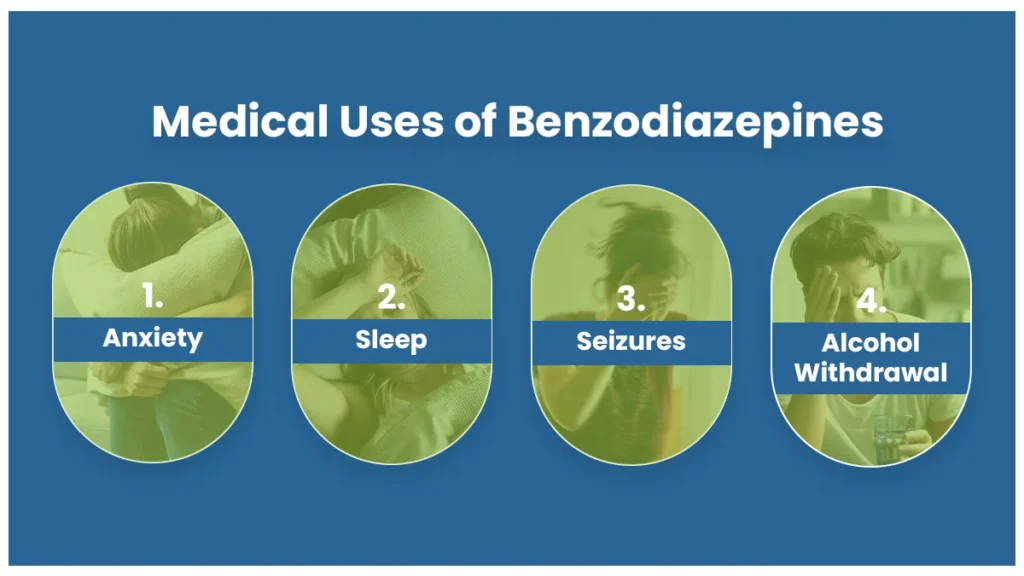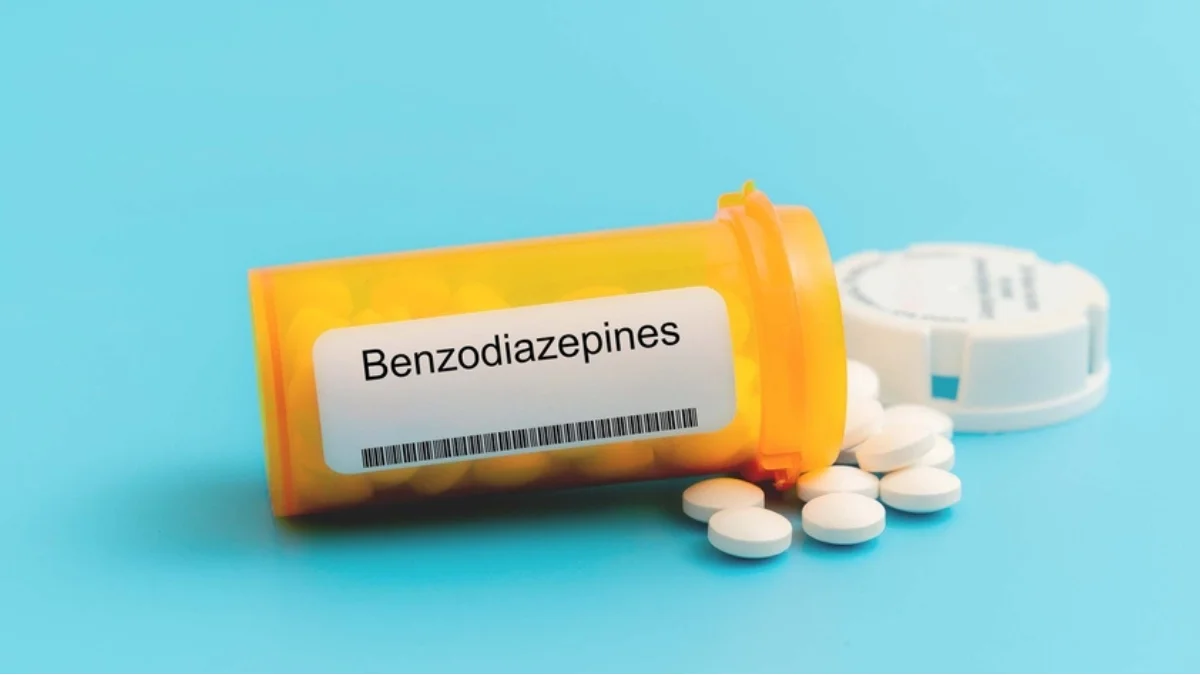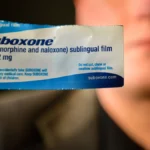Beyond Calm: Complex Reality of Benzodiazepines
Benzodiazepines are medications prescribed to reduce anxiety, induce sleep, and manage seizures. People may use them for short-term relief from stress or insomnia.
Misuse can lead to dependence and harmful side effects. Never exceed the prescribed dose or share medication. Abruptly stopping can cause withdrawal symptoms, and long-term use increases the risk of addiction. Benzodiazepines should not be used as a long-term solution for sustained well-being.

Key Takeaways
People can use benzodiazepines for short-term relief from stress or insomnia. Here’s what you need to know:
- Common benzodiazepine medications prescribed in the United States include diazepam (Valium), alprazolam (Xanax), lorazepam (Ativan), and clonazepam (Klonopin).
- Some people may experience memory issues or difficulty concentrating while using benzodiazepines.
- Using benzodiazepines in higher doses than prescribed or obtaining them through drug use, including street benzos, raises the risk of addiction.
The Haven Detox-Little Rock offers a supportive environment, providing personalized services focusing on well-being needs. Call us at (501) 271-3342 to sketch your recovery.
Benzodiazepines Explained
Benzodiazepines, commonly known as benzos, are a class of prescription medications used to treat conditions like anxiety, insomnia, and seizures. They enhance the effect of a neurotransmitter called gamma-aminobutyric acid (GABA), which helps calm the brain. It leads to a soothing and relaxing effect.
While effective in managing certain medical conditions, they come with risks. Prolonged use can lead to tolerance, dependence, and withdrawal symptoms if stopped suddenly. Use your medications as your healthcare provider prescribes and communicate openly about any concerns or side effects.
Misuse of benzodiazepines can result in adverse effects, including drowsiness, dizziness, and impaired coordination. Additionally, combining them with alcohol or other substances can be dangerous.
Chemical Composition
Benzodiazepines, like diazepam and lorazepam, consist of carbon, hydrogen, nitrogen, and sometimes chlorine atoms. The core structure is a fusion of benzene and diazepine rings. These compounds modulate the central nervous system by enhancing the neurotransmitter GABA’s calming effect.
Specific chemical variations among benzodiazepines result in diverse therapeutic properties. For example, alprazolam contains triazole, contributing to its anxiolytic effects.
It’s crucial to note that variations in chemical structures impact each medication’s potency, the onset of action, and duration. Healthcare professionals can personalize treatments while minimizing risks.
Common Benzodiazepine Medications
Common benzodiazepine medications prescribed in the United States include diazepam (Valium), alprazolam (Xanax), lorazepam (Ativan), and clonazepam (Klonopin). These drugs are used to treat conditions like anxiety, insomnia, and seizures.
Each medication has unique characteristics, such as onset of action and duration, making them suitable for different situations. It’s vital to take these medications exactly as a healthcare professional prescribes to ensure their effectiveness and minimize potential risks.
How Benzodiazepines Work
Benzodiazepines, or benzos, affect the brain by enhancing a neurotransmitter called GABA. GABA’s job is to calm things down in the brain.
Benzos make GABA work better, like a gentle brake, reducing excessive brain activity. This calming effect helps manage anxiety, seizures, and insomnia. They’re prescribed for short-term use due to potential side effects and dependency risks. Rapid tolerance can occur, requiring higher doses for the same effect.
Medical Uses of Benzodiazepines
Benzos serve vital medical purposes in the United States. Clinically valuable due to their rapid onset, benzos provide relief for acute symptoms.
However, their use is typically short-term to minimize the risk of dependence and withdrawal. Learning the medical context and adhering to prescribed guidelines is essential to harness the therapeutic benefits while mitigating potential drawbacks.
For Anxiety
Benzodiazepines are medications used to treat anxiety by calming the brain and nerves. They work fast, bringing relief within 30-60 minutes.
Benzodiazepines provide quick relief during intense anxiety episodes.
They can be valuable for short-term relief from anxiety or panic attacks.
However, prolonged use can lead to dependence. It’s crucial not to stop taking benzos, as withdrawal symptoms may occur abruptly. Your doctor will guide you on gradually reducing the dosage if needed.
For Sleep
Benzodiazepines are sometimes used for sleep, but they come with considerations. Common benzos used for sleep include diazepam and lorazepam. These substances function by soothing the brain and nerves, which leads to relaxation.
Short-term use is okay, but long-term use can lead to dependence. Using benzodiazepine nightly is generally not advised due to likely side effects and the risk of addiction. Sleep quality may also decrease when stopping these medications.
For Seizures
Benzodiazepines can also treat seizures and related conditions. The increased inhibition helps to calm overactive brain signals, making benzodiazepines effective in managing seizures.
One commonly prescribed benzodiazepine for seizures is diazepam. It is often administered intravenously during acute seizure episodes or as a rectal gel for rapid absorption in emergencies. Lorazepam is another benzodiazepine used to treat seizures, particularly in status epilepticus, a prolonged and potentially life-threatening seizure state.
While benzodiazepines can effectively control seizures, their use requires careful consideration of potential side effects and the development of an appropriate treatment plan in consultation with a healthcare professional.
For Alcohol Withdrawal
Benzodiazepines are medications used to manage alcohol withdrawal symptoms effectively. When someone quits drinking, their body may react, leading to anxiety, seizures, and other issues. The benzo medications (diazepam or lorazepam) help ease these symptoms.
Here’s how they work: alcohol affects the brain by increasing a chemical called GABA, which has a calming effect. When someone stops drinking, GABA levels drop, causing withdrawal symptoms. Benzodiazepines boost GABA activity, alleviating these symptoms.
Side Effects of Benzodiazepine Use
Some people may experience memory issues or difficulty concentrating while using benzodiazepines. These effects can be more pronounced in older adults. Here are the side effects:
- Drowsiness and Fatigue: Benzodiazepines can cause drowsiness, making it essential to avoid activities that require alertness, like driving or operating machinery.
- Coordination Issues: Some may experience difficulty with coordination and balance, posing a risk of falls or accidents.
- Memory Problems: Benzodiazepines may affect memory, leading to forgetfulness or difficulty recalling details.
- Dizziness: Feeling lightheaded or dizzy is a common side effect, especially when standing up quickly.
- Tolerance and Dependence: Prolonged use can lead to tolerance, needing more doses for the same effect, and may result in dependence.
- Withdrawal Symptoms: Abruptly stopping benzodiazepines can cause withdrawal symptoms like anxiety, insomnia, and even seizures.
- Cognitive Impairment: Some individuals may experience difficulties with concentration and focus while on benzodiazepines.
- Digestive Issues: Nausea, constipation, or changes in appetite may occur as side effects.
- Paradoxical Reactions: In rare cases, benzodiazepines can cause unexpected reactions, such as increased anxiety or aggression.
- Interaction with Other Substances: Combining benzodiazepines with alcohol or certain medications can intensify side effects and pose serious health risks.
These side effects are vital to understanding, for communicating openly with healthcare experts ensures safe and effective use of benzodiazepines.
Risk of Addiction
Long-acting benzodiazepines, a class of drugs prescribed for anxiety disorders like panic disorder, have effects that can last for weeks. While they can provide relief from symptoms of anxiety, using them in high doses poses a higher risk of addiction and other health conditions.
In recent years, concerns have grown about the risk of overdose and cognitive decline associated with long-term use of benzodiazepines. These medications have different half-lives, meaning the time it takes for the body to eliminate half of the drug. Some have longer half-lives, leading to a slower onset of action but an increased risk of respiratory depression.
Using benzodiazepines in higher doses than prescribed or obtaining them through drug use, including street benzos, raises the risk of addiction. Lower doses for short-term treatment are recommended to minimize these risks.
Individuals must communicate openly with healthcare providers about their health conditions and medications. It ensures a careful assessment of whether benzodiazepines are appropriate and can help manage symptoms effectively while minimizing the potential for addiction and other adverse effects.
Treatment Options for Benzodiazepine Addiction
Addressing benzodiazepine addiction involves a multifaceted approach. Here are some valuable treatment options:
Detoxification (Detox): The first step in treating benzodiazepine addiction is detox, which involves safely managing withdrawal symptoms as the body changes to the absence of the drug.
Medication-Assisted Treatment (MAT): Medication-assisted treatment may be used to help individuals gradually taper off benzodiazepines with medications like diazepam or clonazepam.
Therapy and Counseling: Behavioral therapies, such as cognitive behavioral therapy (CBT), are essential for addressing the psychological aspects of addiction.
Support Groups: Joining support groups, like 12-step programs or SMART Recovery, provides a sense of community and understanding.
Aftercare Planning: Planning for ongoing support is crucial and may include continued therapy, support groups, and strategies to prevent relapse.
Recovery from benzodiazepine addiction is a comprehensive process that combines medical and psychological interventions, support systems, and personalized strategies for maintaining long-term sobriety.
Frequently Asked Questions (FAQ)
What are benzodiazepines most commonly used for?
Benzodiazepines, commonly known as sedatives, are prescribed to alleviate anxiety and insomnia by calming the central nervous system. They are used for a short period, as long-term use can lead to dependence.
Doctors may prescribe them to help manage panic disorders or as muscle relaxants. Taking small amounts is crucial, as higher doses can result in adverse effects. Long-term benzodiazepine use can lead to tolerance and withdrawal symptoms.
Examples include diazepam and lorazepam. Despite their effectiveness, caution is advised due to harsh side effects and the risk of dependency. Consulting a healthcare expert is essential for proper guidance.
What disorders do Benzos treat?
Benzodiazepines commonly treat disorders like anxiety and insomnia. These medications, available in tablet form, work by interacting with benzodiazepine receptors in the brain, producing a calming effect.
In addition to anxiety and insomnia, benzos may be prescribed for muscle spasms and seizures. However, it’s crucial to note potential side effects, including drowsiness and dizziness.
Long-term use can lead to dependence, and sudden discontinuation may cause withdrawal symptoms. It’s essential to follow medical guidance when using these central nervous system depressants, considering their classification as Class C drugs. Unlike antidepressants, benzos act more rapidly, offering quick relief.
The Haven Detox-Little Rock
At The Haven Detox-Little Rock, we understand the challenges of addiction and provide safety and support.
Experience benzodiazepine treatment that enhances recovery, addressing your addiction. Our detox program ensures a gentle transition, while residential services foster holistic healing.
We blend compassion with innovation, fostering a healing atmosphere. With our IV therapy, we deliver targeted care.
Face the path to recovery with confidence. Reach out today at (501) 271-3342 and let us be your trusted partner in overcoming addiction.





